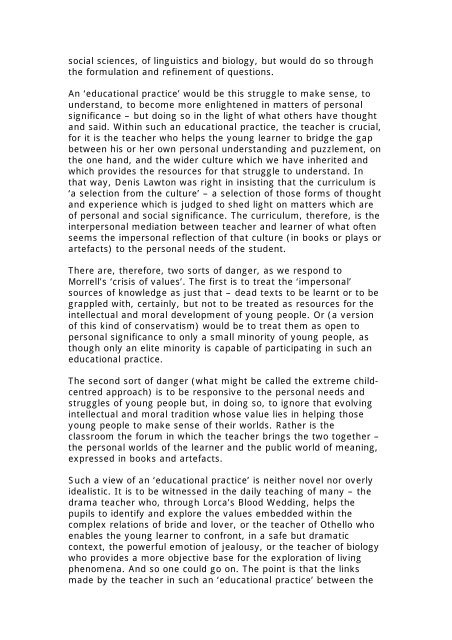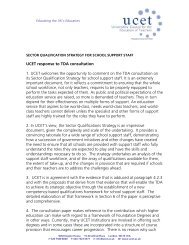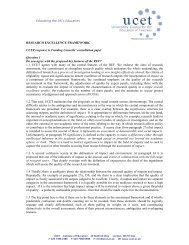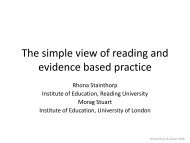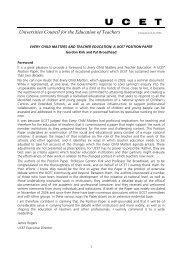The School Curriculum Ten Years Hence - UCET: Universities ...
The School Curriculum Ten Years Hence - UCET: Universities ...
The School Curriculum Ten Years Hence - UCET: Universities ...
Create successful ePaper yourself
Turn your PDF publications into a flip-book with our unique Google optimized e-Paper software.
social sciences, of linguistics and biology, but would do so through<br />
the formulation and refinement of questions.<br />
An ‘educational practice’ would be this struggle to make sense, to<br />
understand, to become more enlightened in matters of personal<br />
significance – but doing so in the light of what others have thought<br />
and said. Within such an educational practice, the teacher is crucial,<br />
for it is the teacher who helps the young learner to bridge the gap<br />
between his or her own personal understanding and puzzlement, on<br />
the one hand, and the wider culture which we have inherited and<br />
which provides the resources for that struggle to understand. In<br />
that way, Denis Lawton was right in insisting that the curriculum is<br />
‘a selection from the culture’ – a selection of those forms of thought<br />
and experience which is judged to shed light on matters which are<br />
of personal and social significance. <strong>The</strong> curriculum, therefore, is the<br />
interpersonal mediation between teacher and learner of what often<br />
seems the impersonal reflection of that culture (in books or plays or<br />
artefacts) to the personal needs of the student.<br />
<strong>The</strong>re are, therefore, two sorts of danger, as we respond to<br />
Morrell’s ‘crisis of values’. <strong>The</strong> first is to treat the ‘impersonal’<br />
sources of knowledge as just that – dead texts to be learnt or to be<br />
grappled with, certainly, but not to be treated as resources for the<br />
intellectual and moral development of young people. Or (a version<br />
of this kind of conservatism) would be to treat them as open to<br />
personal significance to only a small minority of young people, as<br />
though only an elite minority is capable of participating in such an<br />
educational practice.<br />
<strong>The</strong> second sort of danger (what might be called the extreme childcentred<br />
approach) is to be responsive to the personal needs and<br />
struggles of young people but, in doing so, to ignore that evolving<br />
intellectual and moral tradition whose value lies in helping those<br />
young people to make sense of their worlds. Rather is the<br />
classroom the forum in which the teacher brings the two together –<br />
the personal worlds of the learner and the public world of meaning,<br />
expressed in books and artefacts.<br />
Such a view of an ‘educational practice’ is neither novel nor overly<br />
idealistic. It is to be witnessed in the daily teaching of many – the<br />
drama teacher who, through Lorca’s Blood Wedding, helps the<br />
pupils to identify and explore the values embedded within the<br />
complex relations of bride and lover, or the teacher of Othello who<br />
enables the young learner to confront, in a safe but dramatic<br />
context, the powerful emotion of jealousy, or the teacher of biology<br />
who provides a more objective base for the exploration of living<br />
phenomena. And so one could go on. <strong>The</strong> point is that the links<br />
made by the teacher in such an ‘educational practice’ between the


